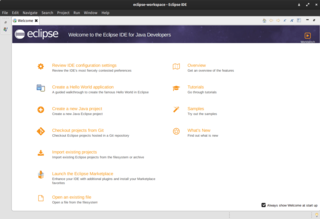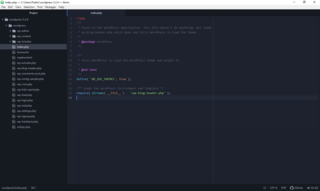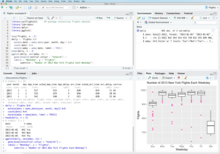An integrated development environment (IDE) is a software application that provides comprehensive facilities for software development. An IDE normally consists of at least a source-code editor, build automation tools, and a debugger. Some IDEs, such as IntelliJ IDEA, Eclipse and Lazarus contain the necessary compiler, interpreter or both; others, such as SharpDevelop and NetBeans, do not.

Eclipse is an integrated development environment (IDE) used in computer programming. It contains a base workspace and an extensible plug-in system for customizing the environment. It is the second-most-popular IDE for Java development, and, until 2016, was the most popular. Eclipse is written mostly in Java and its primary use is for developing Java applications, but it may also be used to develop applications in other programming languages via plug-ins, including Ada, ABAP, C, C++, C#, Clojure, COBOL, D, Erlang, Fortran, Groovy, Haskell, JavaScript, Julia, Lasso, Lua, NATURAL, Perl, PHP, Prolog, Python, R, Ruby, Rust, Scala, and Scheme. It can also be used to develop documents with LaTeX and packages for the software Mathematica. Development environments include the Eclipse Java development tools (JDT) for Java and Scala, Eclipse CDT for C/C++, and Eclipse PDT for PHP, among others.

Markdown is a lightweight markup language for creating formatted text using a plain-text editor. John Gruber and Aaron Swartz created Markdown in 2004 as a markup language that is intended to be easy to read in its source code form. Markdown is widely used for blogging and instant messaging, and also used elsewhere in online forums, collaborative software, documentation pages, and readme files.

GitHub is a developer platform that allows developers to create, store, manage and share their code. It uses Git software, providing the distributed version control of Git plus access control, bug tracking, software feature requests, task management, continuous integration, and wikis for every project. Headquartered in California, it has been a subsidiary of Microsoft since 2018.

Etherpad is an open-source, web-based collaborative real-time editor, allowing authors to simultaneously edit a text document, and see all of the participants' edits in real-time, with the ability to display each author's text in their own color. There is also a chat box in the sidebar to allow meta communication.
Ace is a standalone code editor written in JavaScript. The goal is to create a web-based code editor that matches and extends the features, usability, and performance of existing native editors such as TextMate, Vim, or Eclipse. It can be easily embedded in any web page and JavaScript application. Ace is developed as the primary editor for Cloud9 IDE and as the successor of the Mozilla Skywriter project.

knitr is an engine for dynamic report generation with R. It is a package in the programming language R that enables integration of R code into LaTeX, LyX, HTML, Markdown, AsciiDoc, and reStructuredText documents. The purpose of knitr is to allow reproducible research in R through the means of literate programming. It is licensed under the GNU General Public License.
Codename One is an open-source cross-platform framework aiming to provide write once, run anywhere code for various mobile and desktop operating systems. It was created by the co-founders of the Lightweight User Interface Toolkit (LWUIT) project, Chen Fishbein and Shai Almog, and was first announced on January 13, 2012. It was described at the time by the authors as "a cross-device platform that allows you to write your code once in Java and have it work on all devices specifically: iPhone/iPad, Android, Blackberry, Windows Phone 7 and 8, J2ME devices, Windows Desktop, Mac OS, and Web. The biggest goals for the project are ease of use/RAD, deep integration with the native platform and speed."

Hadley Alexander Wickham is a New Zealand statistician known for his work on open-source software for the R statistical programming environment. He is the chief scientist at Posit, PBC and an adjunct professor of statistics at the University of Auckland, Stanford University, and Rice University. His work includes the data visualisation system ggplot2 and the tidyverse, a collection of R packages for data science based on the concept of tidy data.

Atom is a free and open-source text and source-code editor for macOS, Linux, and Windows with support for plug-ins written in JavaScript, and embedded Git control. Developed by GitHub, Atom was released on June 25, 2015.
A headless browser is a web browser without a graphical user interface.

Visual Studio Code, also commonly referred to as VS Code, is a source-code editor developed by Microsoft for Windows, Linux, macOS and web browsers. Features include support for debugging, syntax highlighting, intelligent code completion, snippets, code refactoring, and embedded version control with Git. Users can change the theme, keyboard shortcuts, preferences, and install extensions that add functionality.

The KDE Gear is a set of applications and supporting libraries that are developed by the KDE community, primarily used on Linux-based operating systems but mostly multiplatform, and released on a common release schedule.

Joseph J. Allaire, better known professionally as J. J. Allaire, is an American-born software engineer and Internet entrepreneur. He created the ColdFusion programming language and web application server, founded Allaire Corporation, OnFolio, FitNow, and RStudio, and created LoseIt! and Windows Live Writer. Allaire is currently the founder and CEO of statistical computing company RStudio.

Electron is a free and open-source software framework developed and maintained by OpenJS Foundation. The framework is designed to create desktop applications using web technologies that are rendered using a version of the Chromium browser engine and a back end using the Node.js runtime environment. It also uses various APIs to enable functionality such as native integration with Node.js services and an inter-process communication module.
Yihui Xie is a Chinese statistician, data scientist and software engineer who formerly worked for RStudio. He is the principal author of the open-source software package Knitr for data analysis in the R programming language, and has also written the book Dynamic Documents with R and knitr.

A notebook interface or computational notebook is a virtual notebook environment used for literate programming, a method of writing computer programs. Some notebooks are WYSIWYG environments including executable calculations embedded in formatted documents; others separate calculations and text into separate sections. Notebooks share some goals and features with spreadsheets and word processors but go beyond their limited data models.

Project Jupyter is a project to develop open-source software, open standards, and services for interactive computing across multiple programming languages.

Netlify is a remote-first cloud computing company that offers a development platform that includes build, deploy, and serverless backend services for web applications and dynamic websites. The platform is built on open web standards, making it possible to integrate build tools, web frameworks, APIs, and various web technologies into a unified developer workflow.















